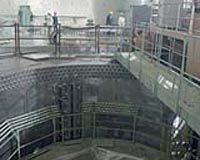| . |  |
. |
Tehran (AFP) Oct 27, 2009 Iran will accept the broad framework of a UN-brokered uranium deal but wants "very important changes," state television said on Tuesday, adding Tehran will offer its formal response within 48 hours. As state-owned Arabic-language television Al-Alam said Iran will demand key changes to the deal, President Mahmoud Ahmadinejad reiterated that Tehran has the right to pursue nuclear technology. "Without a doubt, if there is no justice problems will not be solved," the presidency's website cited him as telling visiting Turkish Prime Minister Recep Tayyip Erdogan. "When an illicit regime possesses nuclear arms, one cannot talk about depriving other nations of a peaceful nuclear programme," he said, referring to Israel, widely believed to be the Middle East's sole nuclear-armed power. "The reality is that the Zionist regime is a threat to all countries ... Your clear stance towards the Zionist regime had a positive effect in the world, especially the Islamic world." Iranian officials continued to express conflicting views on the draft deal. "Iran will accept the broad framework of the deal, but wants very important changes in it," Al-Alam said, quoting a source close to Tehran's nuclear negotiating team. It said Tehran will give its response within "48 hours." The United States said it expected Iran's verdict within days, but refused to comment on Tehran's demands for important changes. "We are going to wait to see what the official response is before we give any kind of possible reaction," State Department spokesman Ian Kelly said, adding that it would be "unfortunate" if Iran rejected the deal. Iran's state-owned English language Press TV reported that Tehran will not shift its entire stock of low-enriched uranium (LEU) -- as hinted at by the proposed deal -- indicating Tehran would demand changes to it. The UN's International Atomic Energy Agency (IAEA), which drafted the deal, refused to comment on the reports, saying it is awaiting Iran's official response. But EU foreign policy chief Javier Solana welcomed Tehran's reported acceptance and said he hoped to talk to Iranian officials on Wednesday, although he did not think the deal required any great adjustments. "The deal was a good deal and I don't think this requires fundamental changes," he said after meeting EU foreign ministers in Luxembourg, adding that "it's very difficult to know what it means: important changes." Since 2006, Solana has been negotiating on behalf of world powers to try to persuade Iran to enter talks on suspending enrichment work in exchange for political and economic benefits. The Iranian television reports come a day after Foreign Minister Manouchehr Mottaki, in a first official response, said Iran might ship part of its LEU abroad, but buying the fuel from a foreign supplier was still an option. France says the deal calls for Tehran to export to Russia more than 1,200 kilos (2,640 pounds) of its 3.5 percent LEU for refining up to 20 percent purity to fuel a Tehran research reactor that makes medical isotopes. World powers back this, as they fear Iran intends to enrich its LEU to even higher levels for use in atomic weapons. Another plus from their perspective is that the Tehran facility is closely monitored by the IAEA. Tehran says its enrichment drive -- the most controversial aspect of its nuclear project -- is peaceful. The IAEA drafted the uranium exchange deal during talks held between Iran and France, Russia and the United States earlier this month in Vienna. Iran was to give its response to the deal last Friday but delayed it until this week amid stiff opposition from some top officials. Influential hardline MP Mohammad Kosari, a member of parliament's committee on national security and foreign policy, said he "rejects the deal," which he says will also "be rejected by the majlis (parliament) by a high margin." It was unclear whether parliament's approval was essential for the deal. But committee chairman Alaeddin Borujerdi said Iran should hand over its LEU in batches as it would help in "confidence-building" with world powers. "We provide part of 3.5 percent enriched uranium to the party in the deal and once we receive the 20 percent, we give another batch of 3.5 percent," Borujerdi was quoted as saying by ILNA news agency. Iran is estimated to have 1,500 kilos of LEU at its enrichment plant in the central city of Natanz, produced in defiance of three sets of UN sanctions. fpn-sgh-burs-jds/srm
Share This Article With Planet Earth
Related Links Learn about nuclear weapons doctrine and defense at SpaceWar.com Learn about missile defense at SpaceWar.com All about missiles at SpaceWar.com Learn about the Superpowers of the 21st Century at SpaceWar.com
 Top Iran MP against shipping uranium in one shot
Top Iran MP against shipping uranium in one shotTehran (AFP) Oct 27, 2009 An influential MP on Tuesday opposed shipping Iran's entire low-enriched uranium abroad in one batch but came out in support of a UN-drafted nuclear deal, which a colleague hailed as a "win-win" plan. The United States, meanwhile, said six world powers held talks on Monday in a bid to maintain a united pressure on Iran to come clean on its controversial nuclear programme as Tehran weighs the ... read more |
|
| The content herein, unless otherwise known to be public domain, are Copyright 1995-2009 - SpaceDaily. AFP and UPI Wire Stories are copyright Agence France-Presse and United Press International. ESA Portal Reports are copyright European Space Agency. All NASA sourced material is public domain. Additional copyrights may apply in whole or part to other bona fide parties. Advertising does not imply endorsement,agreement or approval of any opinions, statements or information provided by SpaceDaily on any Web page published or hosted by SpaceDaily. Privacy Statement |